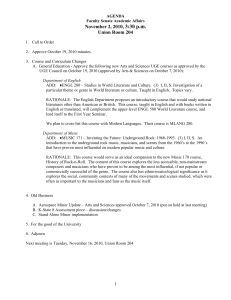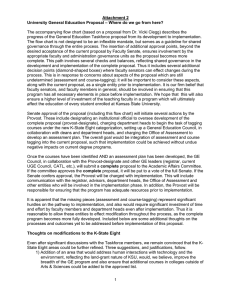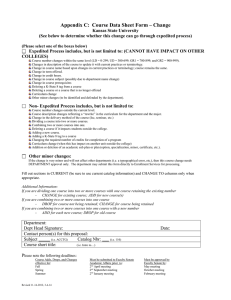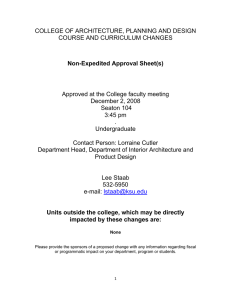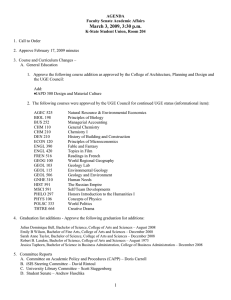A U ssessment
advertisement
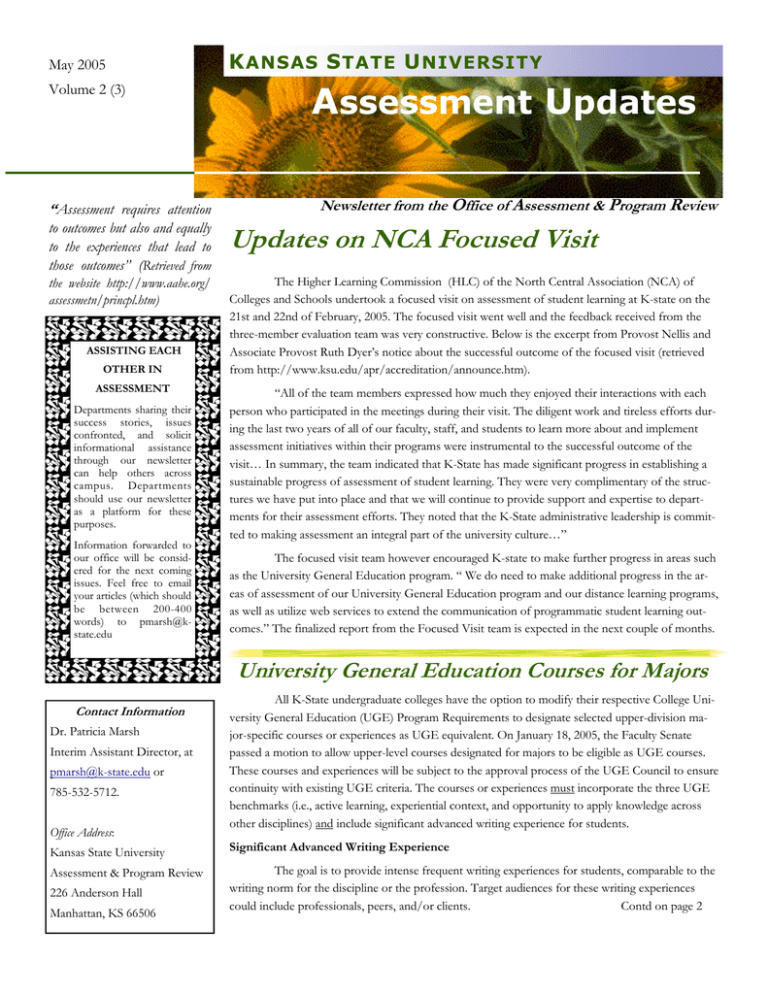
May 2005 Volume 2 (3) “Assessment requires attention K ANSAS S TATE U NIVERSITY Assessment Updates Newsletter from the Office of Assessment & Program Review to outcomes but also and equally to the experiences that lead to those outcomes” (Retrieved from Updates on NCA Focused Visit the website http://www.aahe.org/ assessmetn/princpl.htm) The Higher Learning Commission (HLC) of the North Central Association (NCA) of Colleges and Schools undertook a focused visit on assessment of student learning at K-state on the 21st and 22nd of February, 2005. The focused visit went well and the feedback received from the three-member evaluation team was very constructive. Below is the excerpt from Provost Nellis and Associate Provost Ruth Dyer’s notice about the successful outcome of the focused visit (retrieved from http://www.ksu.edu/apr/accreditation/announce.htm). ASSISTING EACH OTHER IN ASSESSMENT Departments sharing their success stories, issues confronted, and solicit informational assistance through our newsletter can help others across campus. Departments should use our newsletter as a platform for these purposes. Information forwarded to our office will be considered for the next coming issues. Feel free to email your articles (which should be between 200-400 words) to pmarsh@kstate.edu “All of the team members expressed how much they enjoyed their interactions with each person who participated in the meetings during their visit. The diligent work and tireless efforts during the last two years of all of our faculty, staff, and students to learn more about and implement assessment initiatives within their programs were instrumental to the successful outcome of the visit… In summary, the team indicated that K-State has made significant progress in establishing a sustainable progress of assessment of student learning. They were very complimentary of the structures we have put into place and that we will continue to provide support and expertise to departments for their assessment efforts. They noted that the K-State administrative leadership is committed to making assessment an integral part of the university culture…” The focused visit team however encouraged K-state to make further progress in areas such as the University General Education program. “ We do need to make additional progress in the areas of assessment of our University General Education program and our distance learning programs, as well as utilize web services to extend the communication of programmatic student learning outcomes.” The finalized report from the Focused Visit team is expected in the next couple of months. University General Education Courses for Majors Contact Information Dr. Patricia Marsh Interim Assistant Director, at pmarsh@k-state.edu or 785-532-5712. Office Address: All K-State undergraduate colleges have the option to modify their respective College University General Education (UGE) Program Requirements to designate selected upper-division major-specific courses or experiences as UGE equivalent. On January 18, 2005, the Faculty Senate passed a motion to allow upper-level courses designated for majors to be eligible as UGE courses. These courses and experiences will be subject to the approval process of the UGE Council to ensure continuity with existing UGE criteria. The courses or experiences must incorporate the three UGE benchmarks (i.e., active learning, experiential context, and opportunity to apply knowledge across other disciplines) and include significant advanced writing experience for students. Kansas State University Significant Advanced Writing Experience Assessment & Program Review The goal is to provide intense frequent writing experiences for students, comparable to the writing norm for the discipline or the profession. Target audiences for these writing experiences could include professionals, peers, and/or clients. Contd on page 2 226 Anderson Hall Manhattan, KS 66506 Assessment Updates Page 2 Volume 2 (3) UGE Courses….contd from Page 1 Students will be given adequate feedback, in written and/or oral formats, on content and expression. In addition to the feedback, students must be given opportunities to apply the feedback as part of a comprehensive process, either in revision of the original work or in subsequent writing components. UGE Proposal Processes UGE Course proposals should be formatted according to the type of class for which they are designed (i.e., designed with non-majors in mind or designed for majors). Templates for both non-major and major courses can be accessed from the following site: http://www.k-state.edu/catl/ uge/CourseProposals.pdf UGE Standard Statement All approved UGE courses need to have a standard statement in their course syllabus. This statement explains the purpose of University General Education. The statement can be accessed from the following link: http://www.ksu.edu/catl/uge /UGE-syllabi.htm Before submitting a proposal designed for majors, please ensure that your college has modified its UGE Program Requirements (contact your ICCP representative). Course proposals should be completed and submitted to the appropriate department, then college, and then to the University General Education Council (UGE). Once the proposal is received by the UGE Council, it will undergo a 1st reading by a subgroup within the UGE Council. If no questions arise from the 1st reading, the proposal will undergo a 2nd reading by the entire UGE Council. If no questions or concerns arise, the proposal will be approved and forwarded to the Faculty Senate Academic Affairs (FSAA) Committee. Upon review, FSAA will vote to pass the proposal to the Faculty Senate. The Faculty Senate has the final vote to accept the proposal. If approved by the Faculty Senate, the Registrar is notified that the proposed course should be added as an eligible UGE course. A visual model for both proposal processes is available at the following site: http://www.kstate.edu/catl/uge/CourseProposals.pdf. DID YOU KNOW? ** What is the status of my programs’ SLOs and Assessment Plans? A link is now available for each college at K-State on assessment materials received by the Office of Assessment and Program Review. Please access your college at this link: http://www.ksu.edu/apr/majorfield/. This link will be updated at the end of each month, so please check back. ** Memo from Provost Nellis approving the first round assessment plans On April 20th, Provost Nellis approved a set of the assessment plans that were approved and submitted by the different departments and the respective college Assessment Review Committees (CARCs). These included the assessment plans for a number of Bachelors, Masters, Doctoral, and other programs. These approved plans will be posted on the Assessment & Program Review website by the end of May. May 4, 2005 is the next deadline for departments to submit their revised degree-level assessment plans to their deans. (The memo can be accessed at http://www.ksu.edu/apr/new.htm)
